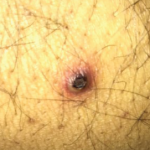NEW YORK (Reuters Health)—Murine and other studies suggest that titanium dioxide (TiO2) nanoparticles, widely used as food additives and in drug formulations, may be involved in intestinal inflammation, according to Swiss researchers.
As Dr. Gerhard Rogler told Reuters Health by email, “It seems that titanium dioxide nanoparticles are not harmful for a healthy person with a normal intestinal barrier. But this may be different in an individual with impaired intestinal barrier function, such as patients with inflammatory bowel disease (IBD).”
In a Feb. 4 online paper in Gut, Dr. Rogler and colleagues at the University of Zurich note that IBD is increasing in many nations undergoing westernization. Among possible causes are microparticles of agents such as Ti02, which are used to improve the appearance of products including food.
The researchers go on to point out that there is increasing evidence that exposure to TiO2 “can cause adverse effects, including the production of reactive oxygen species (ROS) inflammatory responses and tumor formation.”
In addition, the nucleotide-binding oligomerization domain receptor, pyrin domain containing (NLRP)3 inflammasome is activated in the presence of TiO2.
To investigate further, the team orally administered TiO2 nanoparticles to wild-type mice and NLRP3-deficient mice with dextran sodium sulfate (DSS) induced colitis.
Ti02 worsened intestinal inflammation in the DSS mice and following oral gavage, TiO2 crystals were found to accumulate in their spleens.
In vitro investigation showed that TiO2 particles accumulate and activate the NLRP3 inflammasome in human intestinal epithelial cells (IECs) and macrophages. TiO2 particles induced ROS production in IECs and increased epithelial permeability.
Finally, wrote the investigators, “An increase of titanium burden in blood of patients with ulcerative colitis having active disease was found, evidencing an impaired barrier function and suggesting that TiO2 nanoparticles could pose a specific risk to patients with IBD.”
They concluded, “Our results suggest a cautionary use of titanium dioxide in pharmaceutical formulations and support a therapeutic benefit from low inorganic particle diet in patients with IBD.”
Commenting on the findings by email, Dr. Jonathan J. Powell, of the University of Cambridge, UK, told Reuters Health, “Oral exposure to titanium dioxide particles is now very well established in the Western world. Some of these many particles are taken up into gut tissue and, again, it’s established that they concentrate in certain cell types (macrophages that have been termed ‘pigment cells’) of the intestinal lymphoid tissue. There has been speculation that in individuals who are genetically susceptible to inflammatory bowel disease, an abnormal response may ensue.”



